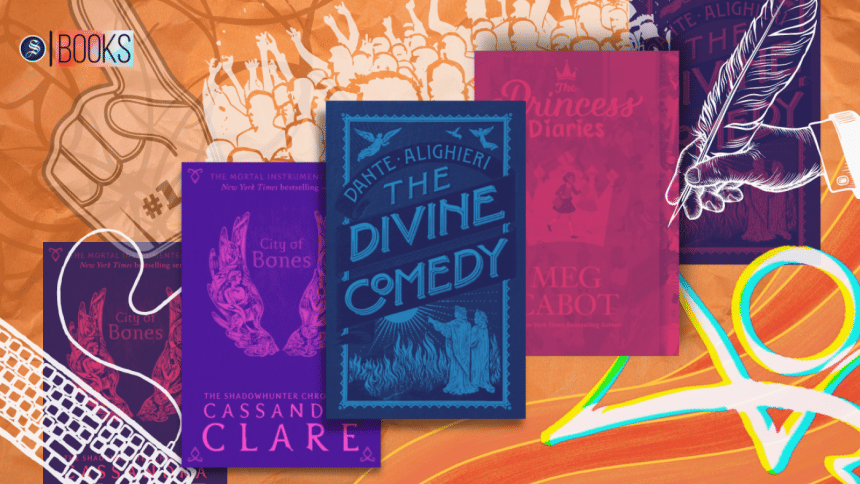Exploring the transformative power of fanfiction

In today's digital era, fanfiction continues to gain popularity, with some perceiving it as an ongoing endeavour where people of all generations express their imaginative ideas by utilising beloved characters from books, TV series, bands etc. Over the years, fanfiction has become an integral part of contemporary literature, steadily increasing in prominence. The advent of the Internet has played a pivotal role in mobilising and expanding fanfic culture, transforming it into a well-established subculture. The community of fanfic readers and writers has experienced exponential growth, enabling individuals to incorporate their own creativity into existing themes, ideas, character settings, and plot intricacies.
Fanfiction represents a unique aspect of artistic expression, where inclusivity reigns supreme for everyone and every story. The true essence of fanfic resides within online communities of dedicated fan readers. Platforms like FanFiction.net, Archive of Our Own, and Wattpad serve as vibrant hubs where the real magic happens. It is there that fanfic writers from diverse backgrounds—regardless of age, gender identity, colour, ability, or religion—take beloved original stories and infuse them with their own distinct twist. These creative renditions can take various forms, such as sequels, prequels, parodies, alternate universes, or crossovers. The term "fanfiction" itself originated in 1939 within the science fiction community, initially used derogatorily to distinguish between amateur sci-fi fiction and professional "profiction." It resurfaced in a 1944 fandom handbook called Fancyclopedia, edited by John "Jack" Bristol Speer, who is widely recognized as the first prominent fan historian. In this publication, fanfiction was formally defined as:
"...[sometimes] improperly used to mean fan science fiction, that is, ordinary fantasy published in a fan magazine... occasionally bringing in some famous characters stf [science fiction] stories. [...] Fictitious elements are often interspersed in account of fan activities, which may make them more interesting, but plays hob with a truth-seeker like [Greek philosopher] Thukydides. Round robins have been attempted in the fanfiction field." (Fancyclopedia 1, 1944).
It may be interesting to note that the history of fanfiction stretches back to ancient times, where stories were often created collectively and collaboratively. While the term "fanfiction" may not have existed, the practice certainly did. Fanfiction has been argued to have influenced significant literary works such as the Homeric epics, Shakespeare's plays, and even Miguel Cervantes' Don Quixote. Early instances of fanfiction can be seen in unauthorised sequels and adaptations of existing works. Examples include biblically inspired stories like Dante's Divine Comedy and the lesser-known poem 'Piers Plowman', as well as Greek mythology-inspired works such as The Iliad and its spin-off, The Aeneid. Many ancient authors, including Aeschylus, Euripides, and Ovid, can be considered fanfiction writers as they expanded on characters and events from earlier works. It is worth noting that some of these fanfiction-based works are now considered classics, demonstrating that the distinction between derivative works and original creations is a relatively recent concept. In the realm of Arthurian legends, the absence of a fixed canon allows for various interpretations and adaptations, resulting in a fanfiction-like multiverse.
My personal journey as a fanfiction reader began when I, on the cusps of teenhood, found myself eagerly consuming the first five books of the Harry Potter series, and grew restless waiting for the next instalment. This led me to delve deeper into the online community of Harry Potter, and discover the immersible realm of fanfiction. Fanfiction provided me an escape from the agonising wait and also allowed me to expand my imagination about a fictional universe beloved to me. Finding fanfiction not only offered a reprieve from the wait in between the book instalments, but also made me learn how to fuel my imagination and sparked within me the passion for storytelling, through exploring the unlimited possibilities within a fictional universe. Fanfiction also allowed readers like me to engage with other readers and fanfiction authors, and actively participate in shaping up alternative narratives within the universe. It enabled us to explore endless plausible scenarios, nurturing our desire for more content through weaving fan creativities into existing and established canon.
Fanfiction thus exemplifies the transformative potential of literature and pop culture, offering consumers and readers an agency to channel their creativity while engaging, moulding, and connecting with the stories and characters from the fictional universe that captivates us. Fanfictions also serve as an invaluable medium for aspiring authors to hone their writing skills and storytelling abilities, and also gather a reader base who stay with them in their journey as a published author too. A prolific example of this is Cassandra Clare, the bestselling author of series like The Mortal Instruments and The Infernal Devices, the former of which even lead to a screen adaptation, first made her name writing Harry Potter fanfiction. Other notable authors who began their writing journeys as fanfiction authors include Naomi Novic (Temerarie series), Leigh Bardugo (Grisha trilogy and Six of Crows duology), Victoria Schwab (Shades of Magic series), Marissa Meyer (Lunar Chronicles series), Sally Thorne (Hating Game), Meg Cabot (The Princess Diaries series), Sarah Rees Brennan (The Demon's Lexicon series) and Christina Lauren (Beautiful Bastard). Bardugo, Schwabb and Novic used to write fanfiction mainly for Harry Potter and Lord of the Rings, romance authors like Thorne and Lauren started off as Twilight fanfiction authors, Meg Cabot wrote fanfiction based off The X-Files and Meyers for Sailor Moon. Even iconic authors like Neil Gaiman are known for initially publishing multiple works of fanfiction based on Chronicles of Narnia and Sherlock Holmes. The ascent of digital and physical platforms and social media has played a pivotal role in fostering fanfiction's popularity as an engaging "third space" for storytelling.
The concept of a "third space" in literature, derived from the work of postcolonial theorist Homi Bhabha, refers to a realm that exists between the creator and the consumer, challenging the binary relationship of authority and power. Bhabha's concept emphasises the transformative potential of cultural hybridity and the subversion of dominant narratives within this liminal space. In Bhabha's theory of the third space, he explores the complexities of cultural identity and the negotiation of power dynamics in postcolonial contexts. He argues that when different cultures come into contact, a third space emerges, which disrupts the fixed notions of identity and creates new possibilities for cultural expression and meaning-making. In the context of fanfiction, the third space represents the interplay between the author's intentions and the reader's interpretations. It challenges the traditional notion of the author as the sole authority and the reader as a passive recipient of meaning. Instead, the third space invites readers to actively engage with the text, bringing their own experiences, perspectives, and cultural backgrounds to the interpretation process. Within this third space, readers have the agency to challenge and subvert dominant narratives. They can question, reinterpret, and negotiate meanings in ways that resonate with their own lived experiences. The text becomes a site of dialogue and interaction, allowing for multiple and diverse interpretations to coexist.
But really, WHY is fanfiction so popular? Let me explain in a way that may make sense.
Pierre Lévy's Cyberculture documents the rise of interconnectedness resulting from the Internet. A core feature of cyberculture, Levy argues, is the development of virtual communities "constructed from related interests and knowledge, shared projects, a process of cooperation and exchange, independent of geographic proximity or institutional affiliations." The fandom thus, is a type of online community. Henry Jenkins defines a fandom as "an interpretive and creative community actively appropriating the content of television [or literature] for its own pleasures." In fandoms, groups form around a common interest and can continue to grow indefinitely. The Harry Potter fandom, while impossible to actually measure, is considered the largest fandom thus far. While the fandom initially developed around the Harry Potter book series, groups have since splintered off based on specific interests within the franchise–favourite characters, preferred relationships (aka ships), alternate plots and continuations–each helping fans in even this most expansive of online fandoms find like minded people with "affinities, intellectual alliances, and even friendships . . . just as they do between people who meet regularly with one another for conversation."
Michel Chaouli, in his insightful analysis of interactive new media literature, highlights how online interactive communications have levelled the playing field in terms of communication. The advent of the Internet played a crucial role in bringing fan fiction writers and readers together, providing a neutral and easily accessible platform for their shared interests and obsessions to flourish. Unlike in the past, where physical fan meetings were necessary, online spaces now allow fans to connect and interact regardless of their geographic location. Fansites, many of which are free for users, offer various options for engagement. Platforms like Tumblr, a popular non-fandom affiliated website, enable users to create personal content, reblog others' content, and engage in discussions through features like tags, replies, questions, and fan mail. Importantly, current American copyright laws allow non-commercial fan fiction to thrive, as long as it remains non-commodified, enabling creative reinterpretation of existing works. The internet's affordability has democratised publishing, empowering anyone to become an author and fostering an environment where authors and readers can interact and respond to one another. This has led to a plethora of original work, both nonfiction and fiction, filling the online landscape.
Ultimately, fan fiction serves as a way station or an incubator for aspiring writers, providing a space to develop their skills and receive feedback. It allows writers and readers to explore speculative and reflective questions about their own lives, attracting attention from others. By portraying familiar characters and their further adventures, nonprofessional creators can find a voluntary audience of like-minded individuals, establishing a unique connection without financial expectations. This has opened up an unprecedented path for new writers to connect with potential readers. Furthermore, fan fiction requires minimal cultural or financial capital. Writers don't need formal training, city relocation, angel investors, or agents, and their offline identities may remain unknown to most readers. All these factors contribute to a sense of participatory equality, empowering fan fiction creators in profound ways.
Kazi Raidah Afia Nusaiba is an aspiring journalist who spends her time reading and researching.
Towrin Zaman is a researcher who loves traveling as much as she loves reading.

 For all latest news, follow The Daily Star's Google News channel.
For all latest news, follow The Daily Star's Google News channel. 











Comments